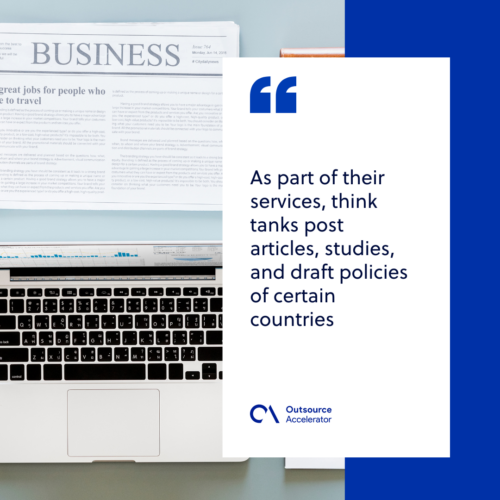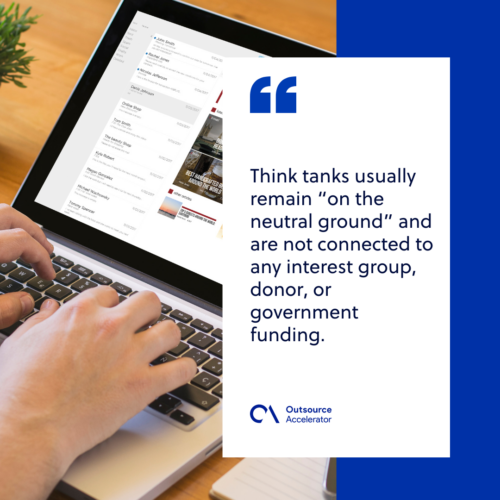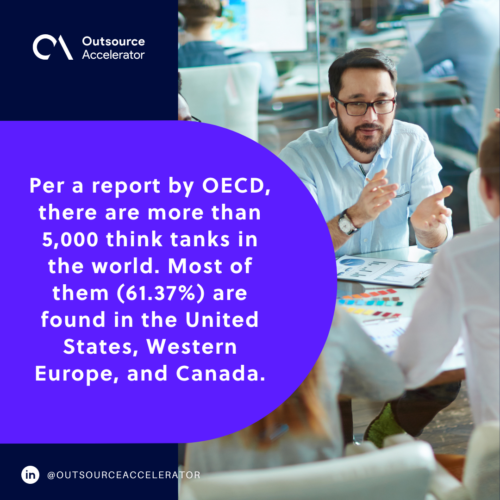Think tanks and their roles in the global economy

Ever wonder how companies do their research on their products and services? That’s where think tanks enter the picture.
Aside from lead generation and marketing efforts, most companies come up with a certain offer as a product of their market research and analysis.
According to a study, the market research industry reached a market size of US$73.4 billion in 2019, more than twofold its growth in 2008.
With the increasing abundance of products and services in the market, market research sure pays off!
Companies changing the world tend to create innovations and revolutionary products such as laptops, online tools, and even the internet, thanks to research.
At some point, research even pushes them to contribute to society and have their social responsibility revolve around their advocacies.
Think tanks play a crucial role in shaping the global economy by providing valuable research and analysis to policymakers.
In the global economy, think tanks form the third category of expert entities, along with governments and businesses, contributing to decision-making at national and international levels.
However, not all companies can fund their R&D teams just to get to know what their customers want from them and how to make their operations more ethical.
What is a think tank, and what’s it good for?
A think tank refers to a group organized to conduct research and provide solutions to issues for various entities, including the federal government, policymakers, and the general public.
They are also referred to as “policy institutes” and, according to a New York Times article, position themselves as “universities without students.”
As part of their services, think tanks post articles, studies, and draft policies for certain countries. However, their research does not just cover socio-political aspects.
As much as think tanks help further policies, some of them could push agendas that their corporate donors value.

The role of think tanks in society
Primarily, think tanks act “as brokers of policy knowledge, centers for research, and incubators of new ideas,” per the Center for International Private Enterprise.
Their primary role is to raise awareness of several economic issues and show policymakers how to act upon them.
Think tanks are considered crucial in measuring and determining how to improve society. Yet, they still need to clearly define their specific roles since some of them could potentially be used in harmful practices.
Think tanks provide research and analysis to assist governments and political parties with policymaking. These organizations shape the policy process by offering evidence-based recommendations on societal issues.
One key aspect of think tanks is their ability to operate independently due to diverse funding opportunities from foundations, corporations, and government grants.
Types of think tanks
Think tanks are classified in different ways, including their affiliations, interests, and functions. Some of the most common types of think tanks are:
- Independent/autonomous. They usually remain “on the neutral ground” and are not connected to any interest group, donor, or government funding.
- Quasi-independent. They are usually not connected to the government. However, quasi-independent think tanks are majorly funded by interest groups, which in turn have significant control over their operations.
- University/political party-affiliated. These think tanks are officially affiliated with a university or political party.
- Government-affiliated. Government-affiliated think tanks receive exclusive funding from the government and usually exist within a certain government agency or department.
- For-profit. These can either be affiliated with a certain corporation or are a standalone entity.
- Corporate think tanks. Corporate think tanks exclusively get funding from corporate entities. They can help a company to further impact the business’s brand and purpose.
- Ideological think tanks. They aim to solve a societal or corporate problem based on their ideological philosophies.
- Specialist tank. Specialist tanks focus on a single specialty, such as foreign policy or education.
- Subnational think tank. They work on a localized area of a country and can function the same as a national-level tank. For instance, a subnational tank can work on research related to a state policy.
- Practical tanks. Lastly, practical tanks or “think-and-do” tanks work the same as a non-government agency (NGO) and do more practical efforts such as charity projects and advocacies.

5 most influential think tanks in the world
Per a report by OECD, there are more than 5,000 think tanks in the world. Most of them (61.37%) are found in the United States, Western Europe, and Canada.
Large enterprises, in most cases, can tap the most influential think tanks for a certain purpose. In a news report, AcademicInfluence listed some of the world’s most influential think tanks.
1. Brooking Institute
The Brookings Institute was founded by a merger of three Washington-based public policy research institutes in 1927. While claiming to be “non-partisan” and “centrists,” it is said that the majority of their donations come from the US Democratic party candidates.
2. The Heritage Foundation
Compared to Brookings Institute, The Heritage Foundation leans more towards its conservative bias.
Most influencing the American society, the foundation primarily aims to “promote conservative public policies based on free enterprise” and several other aspects.
3. Council on Foreign Relations
Established 100 years ago, the Council on Foreign Relations specializes in US foreign policies and international affairs.
The institution boasts its 5,000-member base and influence in expanded fields of research, including information technology, global health, and climate change.
4. Cato Institute
Among the list, the Cato Institute is more considered as a libertarian think tank. They even voice out their strong support to individuals and groups engaging in the peaceful struggle for civil liberties globally.
5. Center for Strategic and International Studies
Last but not least, the Center for Strategic and International Studies once started in 1962 under Georgetown University.
They specialize in analyses of international relations and economies related to US national security.

Will a think tank help my business forward?
More than their political affiliations think tanks serve as advisors to businesses.
The concept of think tanks began as platforms for intellectuals to address complex societal issues, but today, they are instrumental in shaping business strategies and fostering innovation.
They work with a business the way consultants and outsourcing suppliers provide advice and guidance on how you can operate better.
You might think that using a think tank could only serve their political biases. However, a majority of them can give you the following benefits, to no avail.
- Close gaps. Not all businesses – even technology-related ones – could invest time, effort, and resources to keep up with the latest breakthroughs. Think tanks help them find these trends and bring them to the market quickly.
- Act as a liaison. Think tanks can also be reliable sources of information for citizens and businesses on several topics and issues.
- Push innovation further. Lastly, think tanks help contribute to further innovations that are found outside simple research. This is because professionals such as executives, engineers, and marketing experts freely contribute and explore breakthroughs with their institutions.
Engaging with international think tanks can undoubtedly propel your business forward by providing valuable insights and strategic recommendations.







 Independent
Independent




